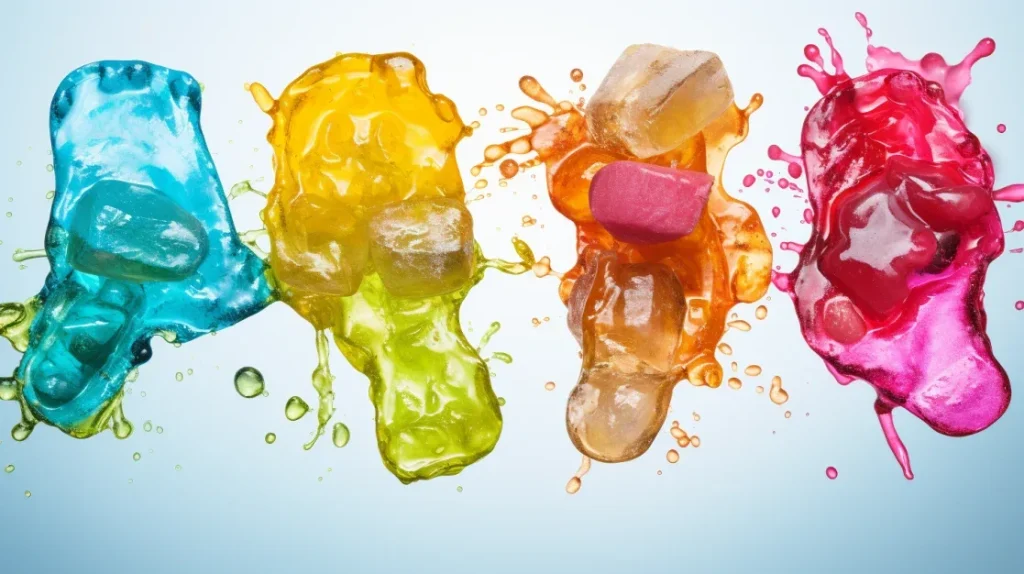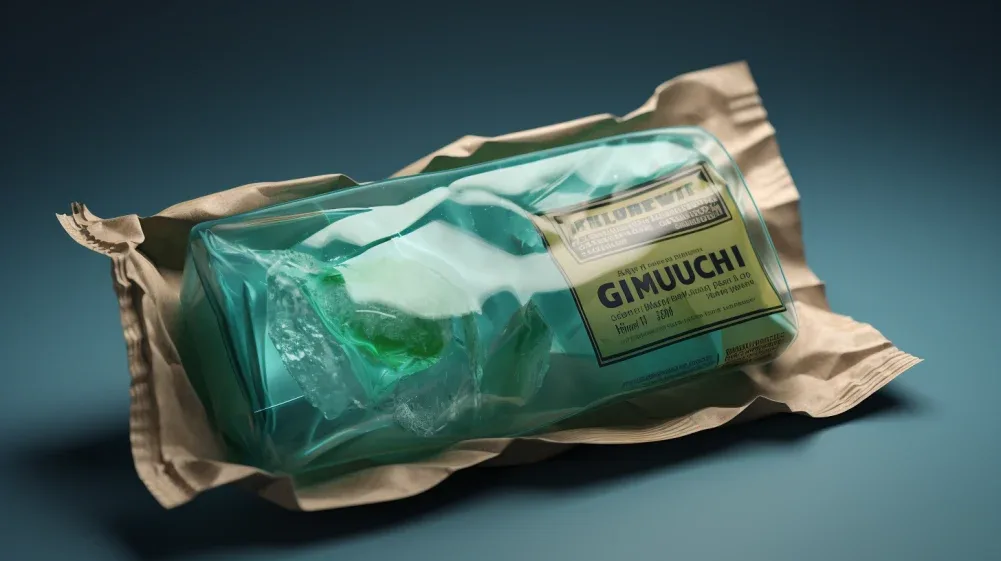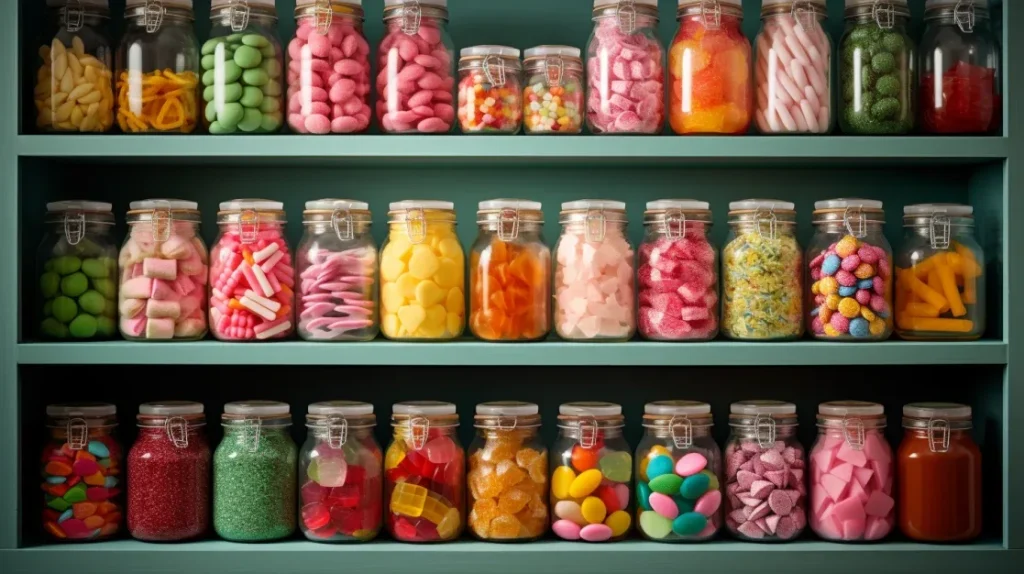Table of Contents
Imagine yourself reaching into your bag, searching for that familiar pack of gum. You finally find it, but doubt creeps in as you pull out a piece and unwrap it. Does gum expire? How long does gum last? These questions might have crossed your mind at some point.
This article will delve into the fascinating world of gum shelf life and freshness. Gum is not just a simple confectionery; it’s a carefully crafted combination of ingredients that provides chewy enjoyment. But like any other food product, gum has an expiration date. Understanding how expiration dates work can help you determine whether your favorite pack is still good or if it’s time to toss it.
So join us as we explore gum composition, debunk myths about its indefinite shelf life, learn how to spot signs of expired gum, and discover proper storage techniques. By the end, you’ll better understand whether that stick in your hand is fresh or past its prime.
Key Takeaways
- Fresh gum has intense flavors that diminish over time, while stale gum becomes stiff and loses its elasticity.
- Chewing fresh gum stimulates saliva production, promotes oral health, and freshens breath.
- Transitioning to sustainable gum options allows for both enjoyment and environmental responsibility, with brands offering biodegradable and natural alternatives.
- Checking the expiration date and consuming gum promptly ensures peak freshness and prevents wastage, while exploring sustainable gum options supports a more sustainable future.
What Is Gum?
Gum, also known as chewing gum, is a famous confectionery product designed to be chewed but not swallowed. It is typically made from a combination of gum base, sweeteners, flavorings, and other additives.
Many people wonder if gum expires; the answer is that gum does not have an official expiration date. However, like any food product, gum does have a shelf life and freshness that can be affected by various factors.
The shelf life of gum can vary depending on the type of gum and the storage conditions. Generally, gum is a stable product that can last for a long time if stored properly. However, moisture, extreme temperatures, and exposure to heat sources can adversely affect gum quality.
Sugar-free gum tends to have a longer shelf life compared to gum with sugar because sugar can provide a breeding ground for bacteria. Gum with sugar may become stiff or lose its original quality over time.
To ensure the optimum quality of gum, storing it in a cool, dry place away from moisture and extreme heat is recommended. Before consuming it, it’s also essential to check for any noticeable changes in the gum, such as a change in texture, taste, or appearance.
In conclusion, while gum does not technically expire, it is essential to understand its shelf life and storage conditions to maintain its freshness and quality.
The Composition of Gum
Gum is made up of several vital ingredients. These include gum bases, sweeteners, flavorings, and softeners. These ingredients are combined during gum manufacturing to create the chewy texture and refreshing taste we all love.
The gum base is responsible for providing the structure and elasticity of the gum. It gives the gum its characteristic chewiness. Sweeteners, such as sugar or artificial substitutes, are added to give sweetness to the gum. These sweeteners can vary depending on the brand and type of gum.
Flavorings are another critical component of gum. They give gum its distinct flavors, such as mint or fruit. These flavorings are added to enhance the taste and make chewing gum a more enjoyable experience.
Softeners are also included in the composition of gum. These softeners ensure the gum has a smooth texture and is easy to chew. They prevent the gum from becoming too hard or brittle.
Understanding the composition of gum is essential when considering expiration dates. The ingredients used in gum can impact its freshness over time. Some components may degrade or lose potency, resulting in a less enjoyable chewing experience. It’s always a good idea to check the expiration date on gum packaging to ensure that you’re getting the best quality product.
Now that you know about the composition of gum, let’s explore the concept of expiration dates and whether or not gum can expire.
The Concept of Expiration Dates
The concept of expiration dates can cause anxiety when your favorite pack of gum has reached its expiration date. Expiration dates are printed on gum packaging to indicate the date until the product is guaranteed to maintain its quality and freshness.
However, there often needs to be more consumer clarity surrounding these dates. Many people mistakenly believe that gum can never expire because it does not contain perishable ingredients like dairy or meat products. This misconception leads to a lot of wasted gum as people throw away perfect packs because they have passed their expiration date.
In the next section, we will explore whether or not gum expires and what happens when it does.
Does Gum Expire?

No, gum has no official expiration date, but it has a shelf life and freshness that several factors can influence. The type of gum and storage conditions can impact its shelf life. While gum is generally a stable product, moisture, extreme temperatures, and exposure to heat sources can affect its quality.
Sugar-free gum typically lasts longer than gum with sugar, as sugar can provide a breeding ground for bacteria. Gum with sugar may become stiff or lose its original quality over time. To maintain the best quality of gum, store it in a cool, dry place, avoiding moisture and extreme heat. Before consuming gum, check for any noticeable changes in texture, taste, or appearance. To give you an idea of how long gum can last, here is a table showcasing the average shelf life of some popular gum brands:
| Brand | Shelf Life |
|---|---|
| Trident | 9 months to 1 year |
| Orbit | 6 months to 1 year |
| Extra | Up to 2 years |
Understanding the shelf life of gum is essential for maintaining its freshness and quality. However, over time, signs of expired gum may start to appear. Let’s explore these signs in the next section without skipping a beat.
Signs of Expired Gum

If you’ve ever chewed on a forgotten pack of gum, chances are you’ve encountered the telltale signs that it has seen better days. Expired gum can exhibit several noticeable changes in both appearance and texture.
- One of the most common signs is discoloration, as the gum may develop dark spots or fade in color over time.
- Additionally, expired gum becomes harder and loses its original softness and elasticity.
- You may also notice a change in taste, with expired gum often having a bland or unpleasant flavor.
- These texture, color, and taste alterations indicate a decline in gum quality and freshness.
Proper storage is critical to ensure your gum stays fresh for extended periods.
Proper Storage of Gum

Storing gum properly is like preserving a delicate flower, ensuring its freshness and longevity. To maintain the quality of your gum, follow these proper storage methods:
- Keep gum in a cool, dry place between 68°F and 77°F.
- Protect gum from direct sunlight or exposure to heat sources.
- Store gum away from strong odors or chemicals that can affect its flavor.
- Seal the packaging tightly after each use to prevent air and moisture from getting in.
By following these guidelines, you can prolong the freshness of your gum and enjoy it at its best quality.
However, despite proper storage methods, it’s important to remember that gum does have an expiration date.
In the next section, we will debunk the myth of indefinite shelf life for gum products.
The Myth of Indefinite Shelf Life

Contrary to popular belief, gum doesn’t last forever, no matter how well you store it. The myth of indefinite shelf life needs to be debunked and misconceptions clarified.
While gum can be stored for a long time without significant changes in texture or flavor, it does have an expiration date. Gum comprises various ingredients, including sweeteners and softeners, which can deteriorate over time. Exposure to air and moisture can also impact the quality of the gum. As a result, expired gum may become more complex or lose its flavor entirely.
Understanding gum’s shelf life limits is crucial for maintaining freshness and ensuring an optimal chewing experience.
Speaking of freshness, let’s explore how it impacts your enjoyment in the next section about the impact of freshness on the chewing experience.
Impact of Freshness on Chewing Experience
To fully appreciate the act of chewing, you must embrace the impact that freshness has on your overall experience. Freshness is not just about flavor; it also plays a crucial role in maintaining good oral health. Here’s how freshness affects your chewing experience:
- Flavor: Fresh gum bursts with intense flavors that gradually fade over time. The more prolonged gum sits on the shelf, the more its flavors diminish.
- Texture: Fresh gum offers a satisfying, springy texture that makes chewing enjoyable. Stale gum becomes stiff and loses its elasticity, resulting in a less pleasant chew.
- Breath Freshening: Fresh gum contains mint or cinnamon that freshens breath effectively. As gum ages, these ingredients lose their potency.
- Oral Health Benefits: Chewing fresh gum stimulates saliva production, which helps neutralize acids and wash away food particles, promoting healthier teeth and gums.
Understanding the impact of freshness on your chewing experience is essential for maximizing enjoyment and oral health benefits.
Food Labels And Expiration Dates
Food labels and expiration dates are essential regarding the freshness and safety of food products, including gum. The dates on food labels, such as the “sell-by” or “best before” date, indicate the peak quality and freshness of the product. Food manufacturers determine these dates based on laboratory tests and storage conditions.
While gum does not necessarily spoil or become harmful after the expiration date, it may lose its original quality and become less enjoyable to consume. Gum with sugar, in particular, may harden or develop an off taste over time.
Consuming gum within a few months of purchase is recommended to ensure optimum quality. Proper storage conditions, such as avoiding extreme temperatures and high humidity, can help maintain the freshness and texture of the gum for an extended period.
In conclusion, while gum doesn’t technically expire, it is best to use it within a reasonable timeframe and pay attention to any changes in texture, taste, or appearance to ensure an enjoyable chewing experience.
Common Ingredients On Food Labels
When you look at the food labels on packaged products, you’ll find a list of common ingredients used in the food. These ingredients are essential components that give the food taste, texture, and functionality. Common elements include flour, sugar, salt, oil, spices, and various additives. Understanding these ingredients helps you make healthy and informed choices about your food.
Labels typically list ingredients in descending order, meaning the ingredient with the highest quantity is listed first. This information can be helpful for individuals with specific dietary needs or allergies. It allows them to avoid foods containing ingredients they are allergic to or need to limit.
Furthermore, it’s important to note that sometimes ingredients can be listed by their scientific or technical names, which may need to be more recognizable to consumers. Food manufacturers must disclose all ingredients, so you must read the labels carefully to understand your consumption.
By familiarizing yourself with common ingredients on food labels, you can make educated decisions about the products you purchase and consume.
Reading Expiration Dates On Food Products
Understanding expiration dates on food products is crucial for maintaining shelf life and ensuring freshness. These dates provide helpful information about the optimal quality and safety of the product.
Commonly found on food labels, expiration dates can be labeled as “sell-by,” “best before,” or “use by.” It is important to note that these dates indicate peak quality rather than when the food becomes unsafe to consume.
The shelf life and storage conditions required for each food product can vary. Factors such as moisture content, temperature, and exposure to heat sources can affect the stability of the item. Extreme temperatures, both hot and cold, can compromise the integrity of the food.
Understanding the expiration dates can help reduce food waste. It enables consumers to make informed decisions about the freshness of the product and helps avoid consuming potentially harmful bacteria or molds.
By reading and understanding expiration dates, consumers can ensure they consume products at their optimum quality while minimizing the risk of foodborne illness. Remember, it’s essential to follow the storage instructions provided by the manufacturer to extend the product’s shelf life.
Factors That Affect Shelf Life and Freshness
Several factors can affect the shelf life and freshness of gum.
- One important factor is moisture content. Gum is a food product; like other food products, it can be affected by moisture levels. Exposing gum to excess moisture can lead to the growth of bacteria and molds.
- Storage conditions also play a significant role in maintaining gum’s shelf life and freshness. It is essential to store gum in a cool, dry place, away from direct sunlight and extreme temperatures. Extreme heat or cold can affect the stability and quality of the product.
- The type of gum can also impact its shelf life. Sugar-free gums tend to have a longer shelf life than gum with sugar due to the absence of a food source for bacteria. However, it is still essential to check the expiration dates on gum packaging to ensure optimum quality.
In summary, factors such as moisture content, storage conditions, and the type of gum can affect the shelf life and freshness. It is always best to use gum before its expiration date and store it correctly to maintain its quality.
Frequently Asked Questions
Can expired gum make you sick?
Consuming expired gum poses no significant health risks. While its freshness and taste may deteriorate, the gum ingredients remain safe. However, it’s always best to check for any signs of spoilage before chewing.
Does the expiration date on gum packaging refer to the freshness or safety of the product?
The expiration date on gum packaging indicates the product’s freshness rather than safety. It is essential to understand that this date refers to the optimal quality and taste of the gum.
Can gum become harmful or toxic if consumed after its expiration date?
Expired gum consumption can have harmful effects. Chemical breakdown can occur over time, changing taste, texture, and potentially toxic substances. It is best to avoid consuming gum past its expiration date.
How long can gum be safely consumed after its expiration date?
Gum can be safely consumed shortly after its expiration date, but long-term effects are unknown. Proper gum storage methods, such as keeping it cool and dry, can help maintain freshness.
Can the taste or texture of gum change over time, even if it hasn’t technically expired?
The flavor and texture of gum can change over time due to environmental factors such as exposure to heat or moisture. These changes may occur even if the gum has yet to expire technically.
How long does it take for gum to expire?
The expiration date of gum can vary depending on the brand and the specific ingredients used. Generally, gum does not have a particular expiration date but rather a “best by” date, indicating when it is freshest and most flavorful. However, if stored properly in a cool, dry place, unopened gum can typically last several months to a year past its best-by date.
Conclusion
So there you have it, gum aficionado! After delving into the world of gum expiration, we can confidently say that gum does expire.
While it may not be as dramatic as a ticking time bomb, expired gum can lose its freshness and become less enjoyable to chew. Remember to check for signs of expiration and store your gum correctly to ensure maximum freshness.
And hey, if you’re feeling particularly eco-conscious, consider exploring sustainable gum options for a guilt-free chewing experience.
Keep that fresh breath game strong!



